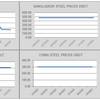Trade association Interferry says that ferry operators in northern Europe face a near-impossible choice in trying to meet the 2015 deadline for ultra-low sulphur emissions from bunker fuel. The association also warns that the low-sulphur legislation will prompt an environmentally damaging modal shift from short-sea to overland transport and pose severe financial implications for the overall European economy. Under pending IMO and soon to be agreed European Union (EU) environmental requirements, vessels operating in the Baltic, North Sea and Channel Emission Control Areas (ECAs) will have to comply with a 0.1% limit on fuel sulphur content. Interferry says it acknowledges ferry operators’ responsibility to reduce emissions and supports the move to lower sulphur limits globally by 2020 - but claims that the 2015 timescale is ‘mission impossible´ due to unsustainable cost increases. It argues that, despite the ferry industry’s efforts to develop alternative technologies and feasible alternative fuels, abatement technologies and financial support will not be available or sufficient enough to avoid a modal
shift from sea to road. These alternatives are the elements in a ‘toolbox’ of technical and financial solutions proposed by the European Commission (EC).
The toolbox suggests the use of ‘clean’ LNG fuel or, for vessels that continue to run on heavy fuel oil, the use of scrubbers - exhaust gas cleaning systems. It also points operators towards EU funding initiatives and state aid.
Interferry responds that these are not realistic options because:
- it is widely recognized in Europe that LNG is only an option for new vessels due to the prohibitive cost of converting existing vessels, and in any case the LNG fuel supply infrastructure is inadequate
- scrubber technology is not a ‘miracle cure’. The association notes that ferry operators are pleased to have contributed financially and operationally in developing the technology and says it is a solution that seems to be able to remove sulphur particles from the exhaust gases on some ships. However, a new Interferry feasibility study covering 108 vessels from six leading operators reveals that scrubbers would not be technically or financially viable for 60% of the existing fleet. Furthermore, trial installations among association members have shown that it will not be possible to have scrubbers in operation in time for 2015 for the other 40%
- EU funding is virtually non-applicable as it applies largely to newbuilds and new routes – a low priority among operators who have invested heavily in new tonnage in recent years, and who now face a desperate economic climate that also reduces the likelihood of state aid.
“There is no financial support for existing ferries, while LNG and scrubbers are not feasible,” says Johan Roos, the association’s executive director of EU and IMO affairs. “In effect, the toolbox is completely empty.
“Our only option is to use marine gas oil – technically straightforward but very costly and potentially counter-productive in environmental terms. Operators have warned that they will not be able to pass on the 70% or more fuel cost increase to customers with a choice of transport modes, which will inevitably push up to 50% of cargo off short-sea ships and back on to the road network.”
He added that, apart from cost, availability is also an issue with MGO, stressing: “At the very least, the IMO must bring forward its availability review from 2018, as mandated in MARPOL Annex VI, to 2012 or 2013. It’s also clear that the ongoing revision of the EU Directive must put provisions in place as to what should happen if low-sulphur fuel is simply not available to operators in 2015.”
Roos conducted the scrubber feasibility study among six Interferry members operating in the north European ECAs - Brittany Ferries, DFDS, Grimaldi Group, P&O Ferries, Stena Line and TT-Line.
The conclusion that more than half their existing ships could not be fitted with scrubbers was based on five critical parameters:












